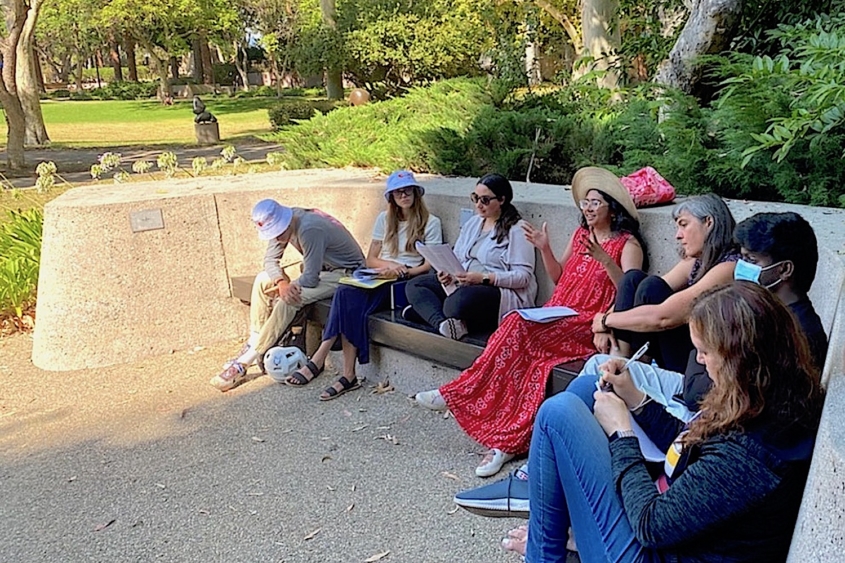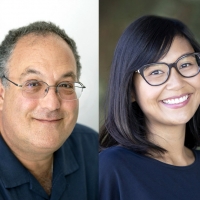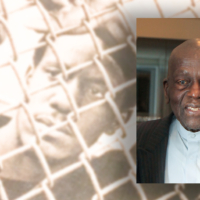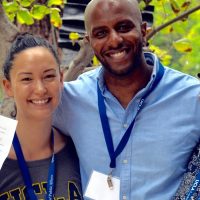
‘Social Workers Who Drive Social Change’ Students from around the world gather at UCLA to reimagine their chosen field through a justice-first lens
By Mary Braswell
The aspiring social workers from around the world gathered on a shaded lawn at UCLA to process what they had seen that morning.
Their visit to an agency on Skid Row, epicenter of Los Angeles’ homelessness crisis, came after several days immersed in conversation about how to engage communities on society’s margins, and the group’s reflections pointed to one overriding question:
How can individual social workers move away from managing misery and toward a transformation of their entire field, upending systems that perpetuate inequity in order to truly change lives?
That aspiration guided this year’s International Summer University in Social Work, hosted by UCLA Luskin Social Welfare over two weeks in July.
More than 20 scholars and graduate students from universities in Australia, Canada, China, India, Israel and Switzerland joined a large UCLA contingent during the collective multinational inquiry.
“We are seeking common practices that promote justice, and we learn from one another,” said Amy Ritterbusch, the assistant professor of social welfare who developed the curriculum with Professor Emerita Rosina Becerra.
‘We are seeking common practices that promote justice, and we learn from one another.’ — Amy Ritterbusch, assistant professor of social welfare
The summer university has convened around the world for more than a decade, governed by a consortium of universities to bring a global lens to core social work theories and practices.
This is the first year that UCLA has hosted, and finding a place on a full agenda were topics such as racism, the wealth gap, gender bias, housing and health inequities, children’s rights and elder abuse.
Faculty members from each participating university shared their scholarship on community engagement, as did the keynote speaker, University of Washington Professor Karina Walters, a triple Bruin who earned her doctorate in social welfare in 1995. Walters drew from her Choctaw heritage and research, using the elements of water, land, air, wind and fire to frame the dialogue.
Off-campus elements of the program revealed the extremes of L.A. society: the structural poverty and exclusion seen on Skid Row and at the Los Angeles LGBT Center, and the spaces of privilege glimpsed during cultural outings to the Hollywood Bowl and Pantages Theater.
Also built into each day’s schedule was space for group dialogue to share the unique cultural perspectives and social work practices each participant brought to the summer university.
Vanessa Warri, a UCLA doctoral student studying social welfare and a leader in the summer university, said the program challenged students to broaden their thinking about their chosen profession.
“There’s a history of social workers showing up as ‘saviors’ — at best providing resources to an underserved community and at worst managing the suffering of a population, but not necessarily helping to alleviate it,” she said. “So how can we engage and advocate in the spaces we are in and build more sustainable communities?”
Before and after the trip to the Society of St. Vincent de Paul’s Cardinal Manning Center on Skid Row, the group grappled with the enormity of the homelessness crisis, the limits of social work, and the concern that taking a tour of life on the streets would be more voyeuristic than educational. The shelter staff invited them to take note of the sights, smells and sounds, then ponder how policies are addressing or not addressing what they observed.
Bobby Benny, a student from the Rajagiri College of Social Science in India, was struck by the dozens of shelters and service providers within a few blocks but wondered how they could possibly meet the needs of the 6,500 unhoused people in downtown Los Angeles, much less the tens of thousands countywide.
“How is that building with 100 beds a solution? How is any of it a solution?” Benny asked as the students gathered back at UCLA. “I’ve seen this in India, but something is different here.”
On the institute’s final day, Benny shared a poem juxtaposing the Los Angeles he had dreamed of and the one he woke up in, where “those skyscrapers were acting as a source of shade for the people who were forgotten in the City of Angels.”
Group presentations allowed all the students to synthesize their experiences and reflect on how they could apply what they learned in their home cultures. And they expressed a desire to stay connected even over long distances.
Said Ritterbusch, “We hope to leave here with a collective commitment to become social workers who drive social change.”
View lectures and photos from this year’s International Summer University in Social Work.









Leave a Reply
Want to join the discussion?Feel free to contribute!